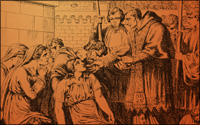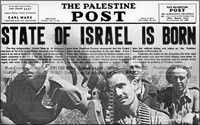 The “Reconquest” of Spain by the Christians ushered in a time of great persecution that eventually led to the complete destruction of the entire Spanish Jewish community.
The “Reconquest” of Spain by the Christians ushered in a time of great persecution that eventually led to the complete destruction of the entire Spanish Jewish community.
Spain was not a united country. It had many states, including Valencia, Catalonia, Aragon, Navarre, Castilla, Granada, Andalusia – each of whom had their own kings and nobles, and who spent a great deal of time warring among themselves.
The main Jewish community was in Barcelona, which was in Catalonia. Next to it was the kingdom of Aragon. Since Aragon was more powerful it really controlled Barcelona. As discussed, Nachmanides had made his speech after the Great Debate in Barcelona. When he left, his disciple, Rabbi Solomon ben Aderet (also known by his acronym, Rashba), took over. He was one of the greatest scholars and commentators to the Talmud that the Jewish people ever had and the acknowledged leader of Jewry in Spain.
We have thousands of his responsa, which exist today in numerous volumes. These were answers to questions sent to him by Jews from all over the Jewish world. Since, however, the majority were from Spain one can see from the questions the life that the Jews lived: a life of persecution, danger and shifting fortunes.
Stairway to Heaven
The king after James was a man called Pedro the Cruel. His name says everything. This was the time of the Hundred Years War (which lasted 117 years) between France and England, a war that decided nothing but destroyed Europe. Spain shifted in alliances back and forth between the two.
Aware of his cruelty, Pedro the Cruel felt he needed a ticket to Heaven — and the Jews were it.
In the medieval mindset, everyone from king to serf was concerned with Paradise and Hell. The obsession with death in all of it gruesome quality is evident in the art, paintings and books of the twelfth to fourteenth centuries in Europe. In those centuries life expectancy was less than 40 years.
From the moment they were born they were aware of death. The question of Heaven and Hell was very real to them. Since most of the kings and knights were murderers, thieves and rapists they were very concerned how to get their way into Heaven.
That is where the Church helped them out. Without going too much into the details of the theory, the Church said that every time a person did a good deed merits were stored up in Heaven under the account of the Church. Since the Church had so many saints it had an inexhaustible reserve of merits.
When a fellow like Pedro the Cruel approached them they told him that to get into Heaven he needed a great deal of merits. One way to get the merits was to buy them with money. The Church called that the selling of Indulgences.
A second way was go off to the Holy Land to fight a crusade against the heretics. In exchange for fighting this war one would receive x-number of merits, just the amount one needed to make up for the moral debt his deeds cost him until now.
A third way was to enforce the doctrines of Christianity in one’s own land and convert the Jews. That also would make up the difference. Indeed, it was a ticket to Paradise.
That is why the least noble of medieval kings also acted the most piously. They needed it the most. A king that never hurt anybody did not need extra merits.
Converting a few thousand Jews was not only a noble deed on behalf of the Church, but a king’s ticket to Paradise. In fact, it could earn him so many surplus merits that he could continue murdering, robbing and raping the rest of his life.
This also helps us understand why pogroms were so popular and so easily organized. It was not only a matter of hatred. The common peasant also needed merits to get to Heaven. Sometimes this was the only way he could get to Heaven, because he did not have the money to buy merits. His only ticket to Heaven was joining a pogrom in the next town.
This does not necessarily explain the entire history of Christian persecution of Jews, but it was not as random as it looked. It was not just a drunken mob entering a Jewish ghetto and destroying it. It was actions based on the hope of personal salvation for the perpetrators.
Economic Measures
Also, for the first time, very severe economic measures were imposed against the Jews of Spain.
The Catholic Church had a strict ban against taking interest. In a purely agrarian economic system it is conceivable to exist without charging interest. However, once Europe discovered that money could be printed it changed the economy of Europe forever, and it was no longer possible to run a sophisticated commercial system without interest.
It was Marco Polo who brought the idea of paper money back from the Far East to Europe. Indeed, paper money is one of the greatest discoveries in the history of civilization. Until then, one had to carry his money around with him — and there was a limit how much one could carry. There were only so many cows and sheep, gold and silver, one could bring with him to the market. However, when paper was used to represent wealth it was literally a life-changing invention. It was nothing less than the turning point of the economic system of the Western world.
A businessman once described economics as follows: There is one box that gets shipped around the world, one person selling it and another buying it. Then the buyer ships it to the next location and becomes a seller, making a profit. If anyone stops the box and opens it the business is finished. You have to keep it moving.
To a certain extent that describes modern economics. Moving the box creates buyers and sellers — and buyers rely on borrowing money. In a system that forbids lending on interest the box does not move.
And the Catholic Church forbade usury. Without the ability to lend with interest there would be no trade. That was where the Jew came in and solved the problem for Christian Europe. Both the Church and the nobleman needed an intermediary. Since the Jew was going straight to Hell anyway, according to Church doctrine, why not use him while he was on this Earth.
Consequently, the nobleman lent money to the Jew at 25% interest and the Jew in turn lent it to the merchants or common people at 33-40% interests, which were normal rates in the Middle Ages.
It was a catch-22, however. The non-Jews forced the Jews into being the middlemen in usurious contracts, but since it was against the law the Jews could always be prosecuted for doing so. Inevitably, there would be kings who spent more than they could get and who were always borrowing. They also needed Jews to borrow from. When the time came to call a moratorium on one’s debts, and one did not have the money, an easy solution was to kick the Jews out or kill them.
That happened with regularity. Spain was the place where this pattern first took form.
Accusations Upon Accusations
Accusations of usury was only one of the ways Christians persecuted Jews.
Blood libels, for instance, began at this time. The libel was that the Jews used the blood of Christians – and later, Christian children – for religious purposes, which ranged from baking matzos on Passover to using it for the wine that Jews drank to usher in and sanctify the Sabbath. Typically, when a Christian child disappeared — which was not a rare occurrence – Jews were accused of taking him.
Another popular accusation was that Jews poisoned the wells. This accusation gained widespread acceptance when the Black Death wracked Europe in the 1300s. It had first ravaged India, Afghanistan and parts of Turkey. Then it was carried from those areas by fleas that lived off of rats that arrived via boats in European ports. Once in Europe it spread like a wildfire.
There were two forms of the plague: one spread by the fleas and another by a virus in the air. The idea that fleas or an airborne virus carried the plague was beyond the understanding of fourteenth century Europeans. Somebody had to be doing it. The scapegoat naturally became the Jews.
How did the Jews do it? They poisoned the wells. How did they know this? They tortured Jews until they confessed.
To protect themselves from Jews poisoning the wells, Christians set up guards around the wells… but the plague continued. It many places it came back a second and third time. They did not realize that in wintertime the virus was temporarily suppressed by the cold. When the weather warmed it came out again. The plague swept Europe three times in the fourteenth century, killing perhaps 20 million people. And it was non-partisan. It killed everyone from the commoner to the king.
In any event, the medieval mind then had to deal with the question: If the wells were guarded, how did the Jews poison them? (That option that the Jews were not poisoning the wells was not considered.) It concluded that the Jews did it through Jewish thoughts or prayers.
It was a long and bitter list of things Jews were accused of. The Church could turn it on and turn it off at will.
Internal Recriminations
In addition to all the external pressures upon the Jews, there was a great deal of recrimination within Spanish Jewry. There was a severe dispute regarding the study of Philosophy, which in many ways was a euphemism for the study of secular subjects.
The Spanish Jew, more than any other Jew in history – until Germany and the United States – felt himself part of Spain. That was not only true under Muslim rule, but Christian rule as well. Now, when all these troubles befell them, many felt it was a punishment from heaven for having, so to speak, watered down their Jewishness.
Others argued that the same types of suffering were happening to Ashkenazic Jews living in France and Germany, yet they did not engage in Philosophy or secular studies and were not part of the fabric of society.
From the beginning of the 1300s until the 1600s, Jews engaged in terrible self-searching debate regarding the debacle of Spain. The debate was highlighted by a dispute between two historical great rabbis, the Chief Rabbi of Barcelona, Rabbi Solomon ben Aderet (the “Rashba”), and the Chief Rabbi of Toledo, Rabbi Asher ben Yehiel (the “Rosh”).
Rabbi Asher ben Yehiel led a very severe criticism of the lifestyle of Spanish Jewry, especially regarding the study of Philosophy. He said that they did not concentrate enough on Torah studies.
This titanic struggle between these two great men ended in a compromise that until the age of 25 one should not study Philosophy. It was an unenforceable compromise, but is nevertheless indicative of the struggle.
As three centuries of a golden era turned increasingly dark, tensions not only from the outside but also from the inside began to add to the burden of Spanish Jewry. It would only be a matter of time before its terrible toll would be exacted.











